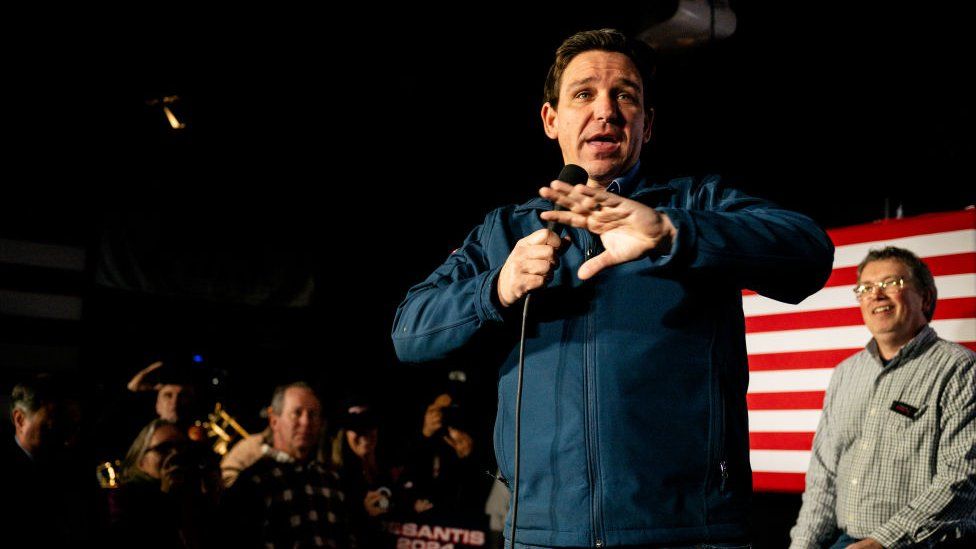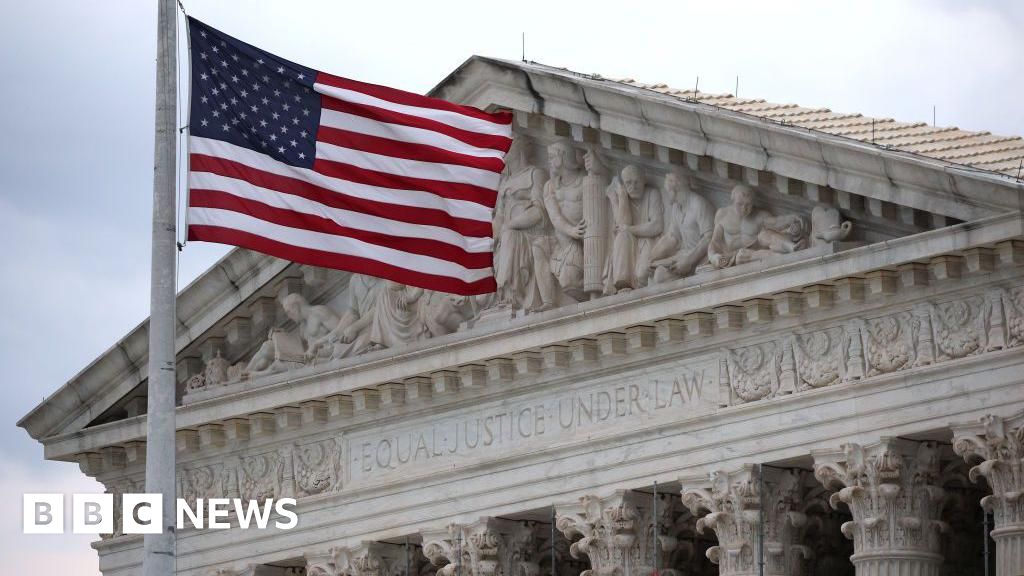ARTICLE AD BOX
 Image source, Getty Images
Image source, Getty Images
Ron DeSantis and his campaign promised a protracted battle for the nomination as recently as last week.
By Bernd Debusmann Jr, Kayla Epstein & Madeline Halpert
BBC News
Ron DeSantis cut an image of confidence in the video that launched his campaign in May 2023: he walked across a flag-adorned stage to cheers and promised his supporters "the Great American Comeback".
Seven months later, the man some called "Trump 2.0" and "Trump without the baggage" has abandoned his White House bid, acknowledging that there is no "clear path to victory" against the dominant frontrunner for the Republican nomination.
So where did things go wrong for the Florida governor, who many conservatives considered a political rock star for his war on "woke ideology" and strong track record in office?
There were problems with the candidate himself - a perceived lack of charisma and his awkwardness with voters - as well as with the campaign he ran. But the real reason for his downfall was simply the man he was up against, Donald Trump.
Looking back at the campaign, experts said it was an almost impossible election cycle for a relative newcomer to the national stage. Mr DeSantis was essentially running against an incumbent, with name recognition, limitless money and a committed base of voters.
Matthew Bartlett, a New Hampshire-based Republican strategist, said that Mr DeSantis could not compete against a figure who enjoyed such unwavering support from his followers.
"He [Trump] has been their political identity, and maybe even personal identity, for the better part of a decade," Mr Bartlett said.
A year ago, when the marathon race for the White House was already underway, it did not feel quite like that.
Mr DeSantis started 2023 as a very real threat to Donald Trump. Back then, when only the former president had announced he was running, Mr DeSantis was at around 35% in the polls, within striking distance of his rival.
He also had momentum after a record re-election victory as Florida governor the previous November. Mr Trump, in contrast, was being blamed by many for the Republicans' disappointing midterm results.
Yet that turned out to be the high water mark for the DeSantis campaign.
By May, when the governor formally announced his run for the White House in an interview with Elon Musk plagued by tech issues, his poll numbers had slumped closer to 20%. Mr Trump had soared back above 50%.
Strategists say the decision to delay the official launch wasted precious months. More importantly, it gave Mr Trump a chance to rebuild his image as a political outsider with the help of the national headlines that surrounded his numerous legal issues.
"[The DeSantis campaign] started pretty late, [and] raised a ton of money obviously," David Kochel, a long-time Iowa Republican strategist, told the BBC. "But by then Trump was going at him hammer and tong. I don't know that they had effective responses. I think it took them a while to engage."
While Mr DeSantis may have privately hoped for the former president's legal troubles to catch up with him, he never criticised Mr Trump for them and instead often echoed his rival's claims that he was being unfairly targeted.
"It seems like every time [Mr Trump] was indicted, his poll numbers went up," said Timothy Hagle, a political science professor at the University of Iowa. "And to some extent, that's not surprising, because it's kind of a 'rally around the chief effect'."
At first, DeSantis used a strategy of trying not to offend Mr Trump. He may have hoped to lure away Mr Trump's base slowly as the legal issues persisted, often saying it was time for the party to move on.
That approach never worked, however. And Mr Trump showed no such restraint.
The former president opted to directly attack Mr DeSantis, often resorting to nicknames including "Meatball Ron" and "Ron DeSanctimonious".
Image source, Getty Images
Image caption,The DeSantis campaign ultimately failed to siphon voters away from former President Donald Trump
Mr Trump has decimated every Republican rival he's come up against since entering the political fray in 2015, including many with more experience on the national stage than Mr DeSantis.
Running for president is a huge step up from running Florida, and thrust into the spotlight Mr DeSantis's limitations as a candidate were exposed - especially when contrasted with Mr Trump's outsized persona.
"When you watch DeSantis mosey around a room, it looks like he feels it's something he has to do to take centre stage," Mary Civiello, an executive communications coach and body language expert, told the BBC at the time of his launch. "It also looks like it's not an everyday thing. You could also perceive he's a little nervous about it, as one might expect."
That awkwardness was a particular problem in Iowa and New Hampshire, the first two states to vote, where retail politics is so important.
"He has a robotic personality that does not resonate with voters," Sean Westwood, a professor of government at Dartmouth College, said of Mr DeSantis. "In a world where almost all of his attention was focused on Iowa, he still barely managed to win over [Nikki] Haley."
Watch: Ron DeSantis says he is endorsing Donald Trump as he ends his campaign
By edging out Ms Haley for second place in Iowa on 15 January, the DeSantis campaign seemed to have bought itself some more time.
Supporters at the caucus night watch party in West Des Moines seemed genuinely pleased with the result - chanting "Ron!" and waving banners. In multiple interviews, they expressed confidence that he was in a strong position going forward.
"He's the clear alternative to President Trump," said college student Jeff Schremer. "Voters can coalesce around him going into New Hampshire and South Carolina."
In the end, Ron DeSantis voters in neither state will get a chance to back him. By suspending his campaign and endorsing Mr Trump before those primaries, the Florida governor is getting out before he risks damaging his standing with Trump's followers.
At 45 years old, however, he knows this is not the end of the road.
One of his supporters, Jack Figge, was also looking to the future when he spoke to the BBC after that underwhelming result back in Iowa. "This is a big year to see who our leader will be, but I'm much more interested in 2028." he said. "DeSantis is my guy."

 1 year ago
78
1 year ago
78








 English (US) ·
English (US) ·